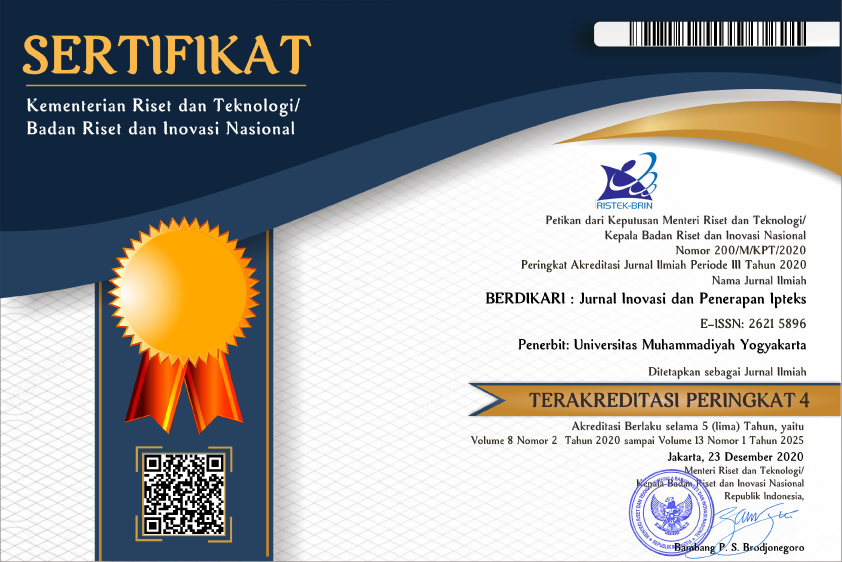Inovasi Kurikulum dan Pembelajaran Pendidikan Singapore
Abstract
Keywords
Full Text:
PDFReferences
Adlini, M. N., Dinda, A. H., Yulinda, S., Chotimah, O., & Merliyana, S. J. (2022). Metode Penelitian Kualitatif Studi Pustaka. EDUMASPUL: Jurnal Pendidikan, 6(1), 974–980.
Alghamdi, A. A. (2023). Exploring Early Childhood Teachers’ Beliefs About STEAM Education in Saudi Arabia. Early Childhood Education Journal, 51(2), 247–256. https://doi.org/10.1007/s10643-021-01303-0
Balakrisnan, V., Kamarudin, N., Ma’rof, A. M., & Hassan, A. (2023). Maker-centred Learning Approach to Craft STEM Education in Primary Schools: A Systematic Literature Review. ASM Science Journal, 18. https://doi.org/10.32802/ASMSCJ.2023.1430
Bui, T., Tran, T., Nguyen, T., Nguyen-Thi, L., Tran, V.-N., Dang, U. P., Nguyen, M.-T., & Hoang, A.-D. (2023). Dataset of Vietnamese preschool teachers’ readiness towards implementing STEAM activities and projects. Data in Brief, 46, 108821. https://doi.org/10.1016/j.dib.2022.108821
Chiu, P. S. (2022). A World Café Approach for Maker Education Context into the Internet of Things Course. Journal of Internet Technology, 23(5), 919–925. https://doi.org/10.53106/160792642022092305001
Davidson, C., & Australia, C. R. (2009). Transcription: Imperatives for Qualitative Research. In International Journal of Qualitative Methods (Vol. 8, Nomor 2).
Gravel, B. E., & Puckett, C. (2023a). What shapes implementation of a school-based makerspace? Teachers as multilevel actors in STEM reforms. International Journal of STEM Education, 10(1), 7. https://doi.org/10.1186/s40594-023-00395-x
Gravel, B. E., & Puckett, C. (2023b). What shapes implementation of a school-based makerspace? Teachers as multilevel actors in STEM reforms. International Journal of STEM Education, 10(1), 7. https://doi.org/10.1186/s40594-023-00395-x
Johnston, K., Kervin, L., & Wyeth, P. (2022). STEM, STEAM and Makerspaces in Early Childhood: A Scoping Review. Sustainability (Switzerland), 14(1353). https://doi.org/10.3390/su142013533
Leskinen, J., Kajamaa, A., & Kumpulainen, K. (2023). Learning to innovate: Students and teachers constructing collective innovation practices in a primary school’s makerspace. https://doi.org/10.3389/feduc.2022.936724
Li, Y., Li, Y., & Qiu, S. (2023). Analysis on the Effectiveness and Mechanisms of Public Policies to Promote Innovation of High-Tech Startups in Makerspaces. Sustainability, 15(9), 7027. https://doi.org/10.3390/su15097027
Montés, N., Zapatera, A., Ruiz, F., Zuccato, L., Rainero, S., Zanetti, A., Gallon, K., Pacheco, G., Mancuso, A., Kofteros, A., & Marathefti, M. (2023). A Novel Methodology to Develop STEAM Projects According to National Curricula. Education Sciences, 13(2), 169. https://doi.org/10.3390/educsci13020169
Mørch, A. I., Flø, E. E., Litherland, K. T., & Andersen, R. (2023). Makerspace activities in a school setting: Top-down and bottom-up approaches for teachers to leverage pupils’ making in science education. Learning, Culture and Social Interaction, 39(November 2021), 100697. https://doi.org/10.1016/j.lcsi.2023.100697
Ottemo, A., Berge, M., Mendick, H., & Silfver, E. (2023). Gender, Passion, and ‘Sticky’ Technology in a Voluntaristically-Organized Technology Makerspace. Engineering Studies, 1–21. https://doi.org/10.1080/19378629.2023.2203396
Pijls, M., van Eijck, T., Kragten, M., & Bredeweg, B. (2022). Activities and Experiences of Children and Makerspace Coaches During After-School and School Programs in a Public Library Makerspace. Journal for STEM Education Research, 5(2), 163–186. https://doi.org/10.1007/s41979-022-00070-w
Rahmadi. (2011). Pengantar Metodologi Penelitian. In Antasari Press. https://idr.uin-antasari.ac.id/10670/1/PENGANTAR METODOLOGI PENELITIAN.pdf
Robinson, A., Gleeson, I., & Ajithkuma, T. (2022). Literature Review Can the use of knowledge-based planning systems improve stereotactic radiotherapy planning? A systematic review. Journal of Radiotherapy in Practice, 22(e89), 1–10. https://doi.org/10.1017/S1460396922000437
Roche, J., Bell, L., Martin, I., Mc Loone, F., Mathieson, A., & Sommer, F. (2021). Science Communication Through STEAM: Professional Development and Flipped Classrooms in the Digital Age. Science Communication, 43(6), 805–813. https://doi.org/10.1177/10755470211038506
Sari, M., & Asmendri. (2018). Penelitian Kepustakaan (Library Research) dalam Penelitian Pendidikan IPA. Penelitian Kepustakaan (Library Research) dalam Penelitian Pendidikan IPA, 2(1), 44. https://ejournal.uinib.ac.id/jurnal/index.php/naturalscience/article/view/1555/1159
Soomro, S. A., Casakin, H., Nanjappan, V., & Georgiev, G. V. (2023). Makerspaces Fostering Creativity: A Systematic Literature Review. Journal of Science Education and Technology, 4. https://doi.org/10.1007/s10956-023-10041-4
Sung, J., Lee, J. Y., & Chun, H. Y. (2023). Short-term effects of a classroom-based STEAM program using robotic kits on children in South Korea. International Journal of STEM Education, 10(1), 26. https://doi.org/10.1186/s40594-023-00417-8
Susanne, W., & Niklas, G. (2022). Transferring makerspace activities to the classroom: a tension between two learning cultures. International Journal of Technology and Design Education, 0123456789. https://doi.org/10.1007/s10798-022-09799-2
Wu, Y., & Ma, Z. (2023). The Power of Makerspaces: Heterotopia and Innovation. Sustainability (Switzerland), 15(1). https://doi.org/10.3390/su15010629
-
DOI: https://doi.org/10.18196/berdikari.v12i1.18875
Refbacks
- There are currently no refbacks.

This work is licensed under a Creative Commons Attribution 4.0 International License.
__________________________________________________________________
Contact us: BERDIKARI : Jurnal Inovasi dan Penerapan Ipteks, Address: Gedung D, LP3M UMY, Alamat: Jl. Brawijaya, Tamantirto, Kec. Kasihan, Bantul, Daerah Istimewa Yogyakarta 55183. Email: berdikari@umy.ac.id

Ciptaan disebarluaskan di bawah Lisensi Creative Commons Atribusi 4.0 Internasional.



